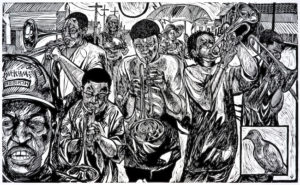
This post will serve as more insight into the lives of the people from New Orleans and how they were affected by Hurricane Katrina, specifically from the perspective of a New ‘Orleanian’. I talk about Wynton Marsalis, a huge influence from New Orleans on the Jazz music created today—Marsalis is an American virtuoso trumpeter, composer, teacher, and the director of Jazz at Lincoln Center in New York City. I also discuss Steve Prince’s perspective briefly and his public thoughts on Hurricane Katrina—I refrain from extreme detail on their personal accounts, because I find it difficult to use their personal accounts on such a tragic and impactful event.
In 2005, the natural disaster Hurricane Katrina hit the United States; on August 29th 2005, the center of Hurricane Katrina passed southeast of New Orleans. The event was a travesty; Katrina impacted the United States, and of course those who were born in New Orleans. It was a significant loss to our history, our culture, and of family. Of the people who were impacted by the event, many were artists including: Steve Prince and Wynton Marsalis. Both individuals, as sons of New Orleans responded to the event; Prince responded with his words and art and Marsalis responded with his words and music. Continue reading “Sons of New Orleans: An Account on Katrina”
